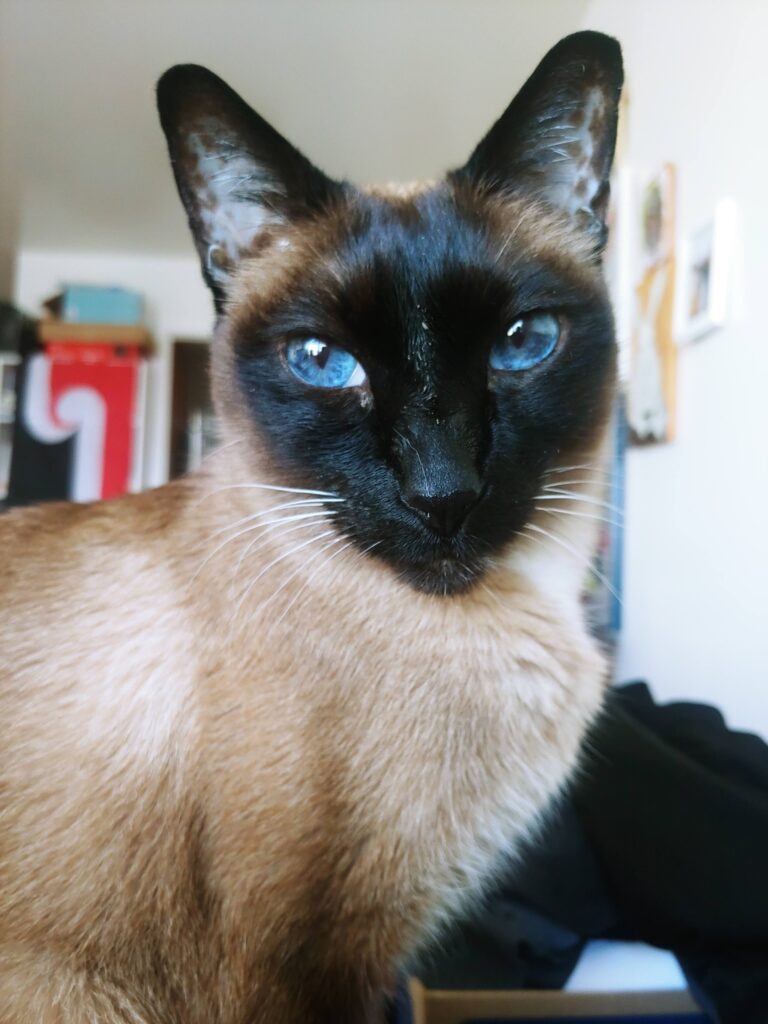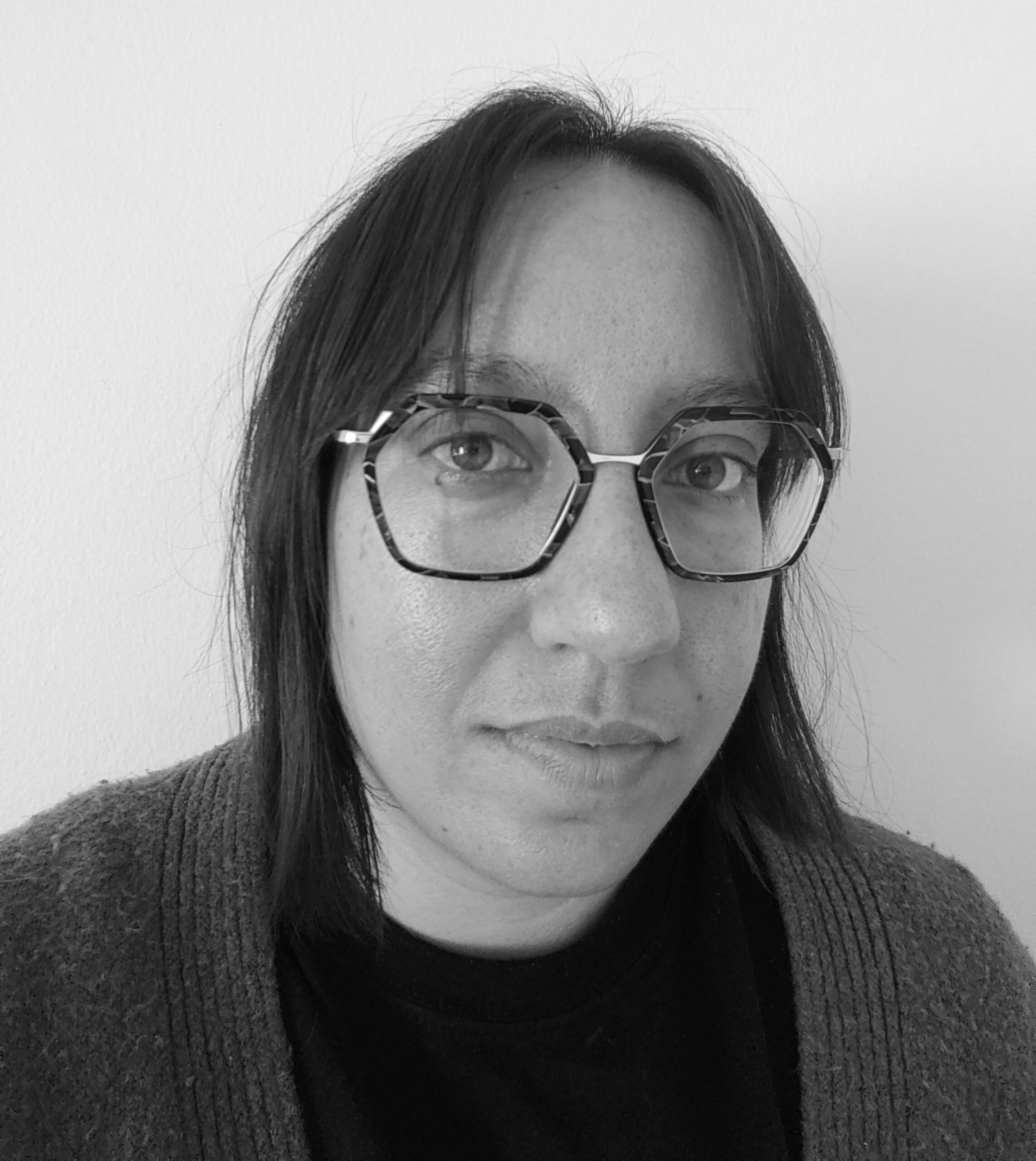Māori Maid Difficult is Nicola Andrews’ debut poetry chapbook, published by Tram Editions in January 2024. It can be found ordered through your publisher, your local bookstore, or found at the library.
Nicola Andrews, congratulations on the publication of your book Māori Maid Difficult. We worked together at the University of San Francisco, but for the sake of our audience, please introduce yourself and briefly describe your literary work and career path to date.
Thank you Charlotte for making time to interview me – it’s nice to have an excuse to chat with you!
Kia ora, I’m Nicky Andrews! I’ve been a library worker longer than I’ve been a poet, so I’ll lead with that: My first full-time job was as a receptionist for Tāmaki Pātaka Kōrero (then known as Auckland City Libraries) in my hometown of Tāmaki Makaurau, Aotearoa (Auckland, New Zealand). From there, I emigrated to the Pacific Northwest and was a page at a public library for many years. I got my MLIS at the University of Washington, and followed that up with a stint as a Fellow at the NC State University Libraries. I’ve always worked in public services.
I also completed a Master of Indigenous Studies from the University of Otago, where I wrote about how institutions such as libraries can reinforce historical trauma for Indigenous library workers, and patrons. As an Indigenous Pacific Islander, Indigenous experiences are the focus of my research. I recently co-authored an article with Sandy Littletree and Jessie Loyer called, Information as a Relation: Defining Indigenous Information Literacy. Over the course of my career, I really hope I can make some kind of positive difference for Indigenous and Pacific Island library workers and users. Last year, UW awarded me the UW iSchool Graduate of the Last Decade (GOLD) Alumni Impact Award, so maybe I’m on the right track.
I’m currently the Open Education Librarian at the University of San Francisco, where I lead our campus open education programme, including serving as a liaison on a $1.5 million dollar grant project led by our colleagues at Loyola Marymount University called OER for Social Justice. I wear a lot of hats, and I’ve recently picked up one more – as one of APALA’s elected Members-at-Large. I am grateful to serve as part of the Executive Board, starting later this year.
I first dabbled in creative writing many years ago, including attending the Voices of Our Nations Arts Foundation (VONA) workshop over a decade ago. I enjoyed the experience but was struck by how prohibitively expensive it was to participate in workshops and classes, especially while only earning minimum wage. I applied to the MLIS programme at UW, and was declined. I decided that I was going to apply once more, and if that didn’t pan out I was going to try for an MFA. Well, I got into UW and then Otago so there’s a gap in my creative writing about the size of two back-to-back graduate degrees!
I started writing poetry in 2021, after realizing during San Francisco’s prolonged shelter-in-place that I was terrible at embroidery, baking bread, and jewelry making. I guess I’ve made up for some lost time – in the last couple of years I’ve been accepted into workshops through Kenyon Review, VONA, Kearny Street, SF Writer’s Grotto, and Tin House.
I am fortunate that now that I have a salary I can participate in these spaces more comfortably, although I’ve received some partial scholarships as well and to be honest I’ve still seen plenty of shockingly high registration or submission fees around. I’ve published a couple of micro-chaps – SENTIMENTAL VALUE (Ghost City Press, 2023, free to download) and AGAPE (Rinky Dink Press, 2024), and last year I won the AAALS Indigenous Writers Prize in Poetry. I’ve also received plenty of rejections from publishers and workshops along the way – I don’t think creative writing is a particularly smooth path for anyone. I wasn’t really expecting to publish a chapbook but my manuscript was selected by Tram Editions, and I’m honored to share that collection more broadly.
As a Korean American settler colonist myself, I really identified with these poems, and they actually changed the way I saw my identity because of the beautiful humor that balanced some of the serious topics. Can you speak a little to that, about your identity in your writing?
Sure! Something I am pretty forthcoming about is that I am mixed race (Māori, Pākehā); which is something that feels quite different back home than here in the United States. The first official mixed race marriage in Aotearoa took place in 1823, and although racism exists back home, mixed-race marriage was never illegal. We are taught to acknowledge all of our whakapapa, which means not cherry-picking ancestors or parts of our background (although we may not know much about all of them). When you have grow up among multiple cultures, and then become further entrenched in other cultures (like diaspora, or queerness, or academia, etc.) there can be a lot of tension or contradiction in one’s surroundings – and sometimes, that can make for a very heartwrenching set-up – or maybe just a good joke, depending on the day. I also adore wordplay, and as my ability to speak te reo inches along, so does my ability to play within two languages.
You’re being interviewed by a librarian, for an audience of Asian Pacific Islander Desi American librarians. What are your thoughts on libraries, and their place in building diverse communities?
I think that libraries can engage with community members to hear their needs, and come closer to meeting them. However, I don’t believe that libraries can be everything for everyone – especially in a time of austerity and duress. As a profession, we can all do better for each other and our communities – but we are also in a political situation where we need our communities to advocate for us, and vote down policies that aim to erode our ability to develop collections, engage in professional development, and keep our branches staffed and open.
We’re always looking for more to read. Who are five authors we should be reading and why?
I recently acquired four books (i.e., the entire back-catalog) from my publisher, Tram Editions, with the intent to read them in order. First up is Paper and Stick, by Priscilla Wathington. Priscilla is a Palestinian American writer, editor, and human rights advocate living in the Bay Area. Her poems in this collection include works constructed from detainee statements, military orders, and soldier testimonies. I am proud to be Priscilla’s pressmate.
Sasha taqwšəblu LaPointe is an Upper Skagit/Nooksack writer of memoir and poetry. Her latest book, Thunder Song: Essays includes writing about sovereignty, love, and healing. As a brown person who grew up listening to punk and riot grrrl and wondering how I could fit into an artistic and political environment dominated by whiteness, I could relate to many of the things Sasha cleverly writes about.
I’m writing this during the #PasifikaReadathonChallenge, put together by Pacific Islanders in Publishing. I’m one of 40 Pasifika shouting out books by Pacific Islanders, which also means I’m getting around to my to-be-read pile! One book I’m particularly looking forward to is Tauhou by Kōtuku Titihuia Nuttall (Te Ātiawa, Ngāti Tūwharetoa, W̱SÁNEĆ). Kōtuku is Coast Salish and Māori, and explores her complex Indigenous identity in this innovative hybrid work.
Another Māori author you might consider reading is Alice Te Punga Somerville, whose debut full-length poetry collection, Always Italicise: How to Write When Colonised won the poetry category of the Ockham New Zealand Book Awards last year. Luckily for those of us in North America, it has since been re-published by University of Hawai’i Press. Alice’s work investigates sovereignty, white supremacy, and impact of colonization. There is a touching poem about Indigenous academics that I am thinking of reading for my workplace’s Oceanic Commencement Ceremony this month.
Lastly, my colleague Brandon Logans is publishing his debut poetry collection – Phosphene – and I can’t wait to see what poetic gorgeousness he has come up with. Pre-order it now!
What advice would you give young professionals, especially those from diverse backgrounds, who are interested in a career in writing?
I once heard it recommended that you should figure out what job you personally can take that will generate the most money with the least amount of time, to free up the maximum amount of time to dedicate to writing. I mean, gosh, who wouldn’t want to do that, whether a writer or not? There’s a ring of truth there, though – every writer I know is an academic / lawyer / non-profit advocate and is burnt-out and overworked, it’s a miracle we have any energy left for the craft of writing, at all!
So I guess my advice is to reflect on why you want to write, and then carve out that time somewhere in your schedule, and defend it very fiercely. Over the last year I have found that I could very easily fill that time with writing-adjacent things – reading at events, dealing with publishing paperwork, maintaining social media, supporting other writers – but these things cannot replace the act of writing.
When you decide to publish your work, be firm on what your non-negotiables are if you are someone from a traditionally underpublished background. I do not italicize or define te reo Māori words in my work – I will not exoticize a language my ancestors were punished for speaking. If I’m using te reo, it’s because it is common vernacular back home – although I will introduce words if I’m performing my poems for an American audience.
In publishing Māori Maid Difficult, I insisted we use cover art from a Māori artist, and blurbs by Māori poets; even though the publisher could not arrange distribution in Aotearoa. The title Māori Maid Difficult is a silly in-joke that probably doesn’t make sense for most American audiences, but my editors at Tram Editions went with it – but puns are good that way, too. Funnily enough, I’ve received some messages over the last couple months from readers and librarians in Aotearoa who are willing to pay the extra shipping to get my book anyway – it has been very touching to see my pukapuka make its way home.
We love to include pictures and social media handles to help our readers get to know you and stay connected. Please include any pictures and social media accounts you’d like to share with our readers
Any excuse to share pictures of my darling cat. You can find me on IG as @poi_division, and for better or worse, I’m trying to replace twitter with LinkedIn. I have links to my library and creative writing works on my personal website. See you online!

This interview was conducted by Charlotte Roh and edited by Noelle Cruz.
Book reviews and author interviews featured on APALAweb.org are reflective of the reviewer and interviewer only and are conducted separately from and independently of APALA and the APALA Literature Awards Committee and juries.

